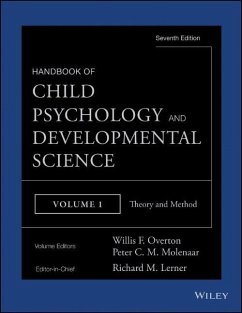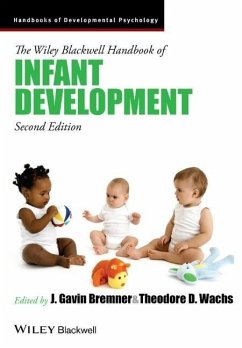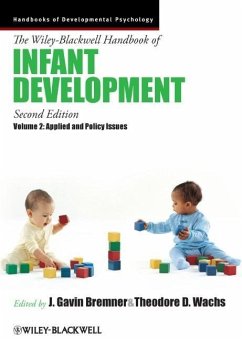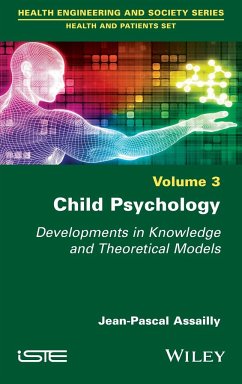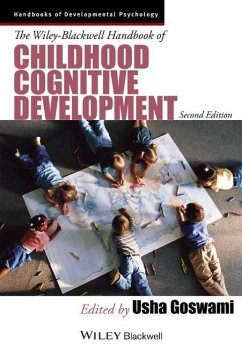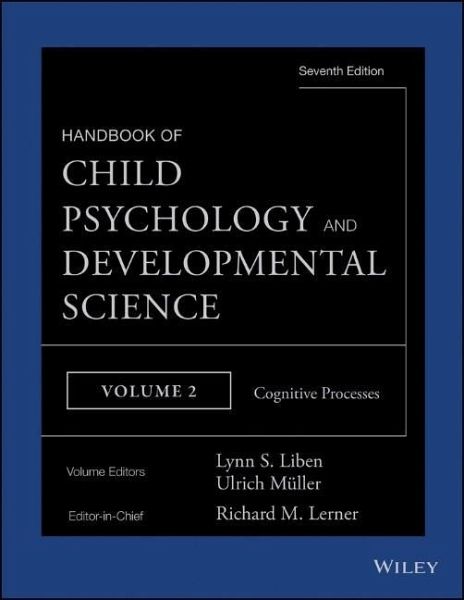
Handbook of Child Psychology and Developmental Science, Cognitive Processes
Versandkostenfrei!
Versandfertig in über 4 Wochen
231,99 €
inkl. MwSt.
Weitere Ausgaben:

PAYBACK Punkte
116 °P sammeln!
The essential reference for human development theory, updated and reconceptualizedThe Handbook of Child Psychology and Developmental Science , a four-volume reference, is the field-defining work to which all others are compared. First published in 1946, and now in its Seventh Edition, the Handbook has long been considered the definitive guide to the field of developmental science.Volume 2: Cognitive Processes describes cognitive development as a relational phenomenon that can be studied only as part of a larger whole of the person and context relational system that sustains it. In this volume,...
The essential reference for human development theory, updated and reconceptualized
The Handbook of Child Psychology and Developmental Science , a four-volume reference, is the field-defining work to which all others are compared. First published in 1946, and now in its Seventh Edition, the Handbook has long been considered the definitive guide to the field of developmental science.
Volume 2: Cognitive Processes describes cognitive development as a relational phenomenon that can be studied only as part of a larger whole of the person and context relational system that sustains it. In this volume, specific domains of cognitive development are contextualized with respect to biological processes and sociocultural contexts. Furthermore, key themes and issues (e.g., the importance of symbolic systems and social understanding) are threaded across multiple chapters, although every each chapter is focused on a different domain within cognitive development. Thus, both within and across chapters, the complexity and interconnectivity of cognitive development are well illuminated.
Learn about the inextricable intertwining of perceptual development, motor development, emotional development, and brain development
Understand the complexity of cognitive development without misleading simplification, reducing cognitive development to its biological substrates, or viewing it as a passive socialization process
Discover how each portion of the developmental process contributes to subsequent cognitive development
Examine the multiple processes - such as categorizing, reasoning, thinking, decision making and judgment - that comprise cognition
The scholarship within this volume and, as well, across the four volumes of this edition, illustrate that developmental science is in the midst of a very exciting period. There is a paradigm shift that involves increasingly greater understanding of how to describe, explain, and optimize the course of human life for diverse individuals living within diverse contexts. This Handbook is the definitive reference for educators, policy-makers, researchers, students, and practitioners in human development, psychology, sociology, anthropology, and neuroscience.
The Handbook of Child Psychology and Developmental Science , a four-volume reference, is the field-defining work to which all others are compared. First published in 1946, and now in its Seventh Edition, the Handbook has long been considered the definitive guide to the field of developmental science.
Volume 2: Cognitive Processes describes cognitive development as a relational phenomenon that can be studied only as part of a larger whole of the person and context relational system that sustains it. In this volume, specific domains of cognitive development are contextualized with respect to biological processes and sociocultural contexts. Furthermore, key themes and issues (e.g., the importance of symbolic systems and social understanding) are threaded across multiple chapters, although every each chapter is focused on a different domain within cognitive development. Thus, both within and across chapters, the complexity and interconnectivity of cognitive development are well illuminated.
Learn about the inextricable intertwining of perceptual development, motor development, emotional development, and brain development
Understand the complexity of cognitive development without misleading simplification, reducing cognitive development to its biological substrates, or viewing it as a passive socialization process
Discover how each portion of the developmental process contributes to subsequent cognitive development
Examine the multiple processes - such as categorizing, reasoning, thinking, decision making and judgment - that comprise cognition
The scholarship within this volume and, as well, across the four volumes of this edition, illustrate that developmental science is in the midst of a very exciting period. There is a paradigm shift that involves increasingly greater understanding of how to describe, explain, and optimize the course of human life for diverse individuals living within diverse contexts. This Handbook is the definitive reference for educators, policy-makers, researchers, students, and practitioners in human development, psychology, sociology, anthropology, and neuroscience.





